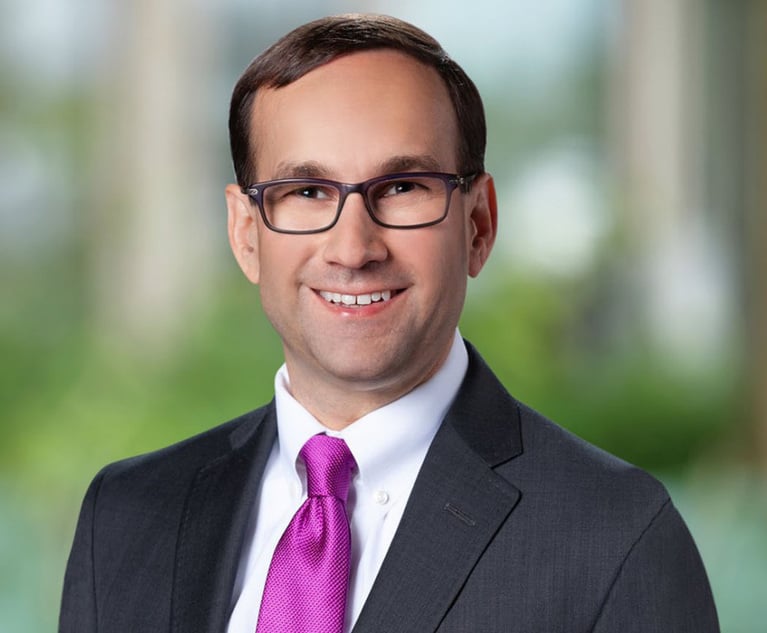IP: Twitter terms of service do not provide “others” with affirmative defense to copyright infringement
Just because content is posted on the Internet does not mean it is free for reproduction and redistribution without permission.
February 05, 2013 at 07:22 AM
4 minute read
The original version of this story was published on Law.com
Just because content is posted on the Internet does not mean it is free for reproduction and redistribution without permission. An original work of authorship fixed in a tangible medium of expression is protected under federal copyright laws. Copyright protection attaches automatically the moment an original work is created. Neither registration nor notice is required for the work to be protected. There are benefits to timely registration, however, the primary of which is the availability of statutory damages in lieu of actual damages for infringement. If elected, statutory damages can be up to $30,000 per infringement or up to $150,000 for willful infringement at the discretion of the court.
The owner of the copyrights in a work has the exclusive rights to reproduce, distribute, display, perform and make derivative works of the original work. Publishing a work on the Internet does not divest the copyright owner of those rights.
Daniel Morel is a photojournalist. When a devastating earthquake struck Haiti in 2010, Morel was on the scene. He captured a number of images of the aftermath and posted the photographs on Twitter through his TwitPic account. A number of publications, including Agence France Presse (AFP), the Washington Post, along with photo warehouse Getty Images, copied Morel's photos to their databases and/or published the photos on their web sites. AFP sued for a declaration of noninfringement, and Morel counterclaimed for copyright infringement.
The counterclaim defendants did not contest that they engaged in conduct with regard to Morel's photos that, absent a valid affirmative defense, would infringe Morel's exclusive rights to reproduce, distribute and publicly display the photos. Instead, AFP et al. argued that by posting the photos on Twitter, Morel granted them a license to reproduce, distribute and display the photos.
The Twitter Terms of Service (TOS) undisputedly applied to Morel's photos posted on Twitter. The parties disputed, however, whether the TOS granted the counterclaim defendants, in addition to Twitter, a license to use those photos.
The Twitter TOS provided in relevant part:
You retain your rights to any Content you submit, post or display on or through the Services. By submitting, posting or displaying Content on or through the Services, you grant us a worldwide, non-exclusive, royalty-free license (with the right to sublicense) to use, copy, reproduce, process, adapt, modify, publish, transmit, display and distribute such Content in any and all media or distribution methods (now known or later developed).
You agree that this license includes the right for Twitter to make such Content available to other companies, organizations or individuals who partner with Twitter for the syndication, broadcast, distribution or publication of such Content on other media and services, subject to our terms and conditions for such Content use.
Such additional uses by Twitter, or other companies, organizations or individuals who partner with Twitter, may be made with no compensation paid to you with respect to the Content that you submit, post, transmit or otherwise make available through the Services.
None of the counterclaim defendants partnered with Twitter or received express consent from Twitter to redistribute Morel's photos. The counterclaim defendants argued that they were third-party beneficiaries of the license agreement between Morel and Twitter, claiming in particular that the Twitter TOS intended to confer a benefit, in the form of a license, on Twitter's “other users.”
In granting Morel's motion for summary judgment of copyright infringement as to AFP and the Washington Post, the court held that an “individual may be a third-party beneficiary to a contract if the terms of the contract 'necessarily require' that the promisor conferred a benefit on that third party.” The court reasoned that the Twitter TOS did not necessarily require that Morel conferred a benefit on AFP et al. as third party beneficiaries and thus there was no license grant and no affirmative defense for their infringement.
Absent an express statement to the contrary, content on the Internet is not dedicated to the public domain and free for all to reproduce and distribute. Before “borrowing” content, steps should be taken to acquire a license appropriate for the intended use. Conversely, content creators need to be aware of third party sites' Terms of Use and the scope of rights content creators are granting to those sites and their affiliates by posting their original content on the sites.
This content has been archived. It is available through our partners, LexisNexis® and Bloomberg Law.
To view this content, please continue to their sites.
Not a Lexis Subscriber?
Subscribe Now
Not a Bloomberg Law Subscriber?
Subscribe Now
NOT FOR REPRINT
© 2024 ALM Global, LLC, All Rights Reserved. Request academic re-use from www.copyright.com. All other uses, submit a request to [email protected]. For more information visit Asset & Logo Licensing.
You Might Like
View All
Digging Deep to Mitigate Risk in Lithium Mine Venture Wins GM Legal Department of the Year Award
5 minute read
FTC Settles With Security Firm Over AI Claims Under Agency's Compliance Program
6 minute read
People and Purpose: AbbVie's GC on Leading With Impact and Inspiring Change
7 minute readTrending Stories
- 1Cars Reach Record Fuel Economy but Largely Fail to Meet Biden's EPA Standard, Agency Says
- 2How Cybercriminals Exploit Law Firms’ Holiday Vulnerabilities
- 3DOJ Asks 5th Circuit to Publish Opinion Upholding Gun Ban for Felon
- 4GEO Group Sued Over 2 Wrongful Deaths
- 5Revenue Up at Homegrown Texas Firms Through Q3, Though Demand Slipped Slightly
Who Got The Work
Michael G. Bongiorno, Andrew Scott Dulberg and Elizabeth E. Driscoll from Wilmer Cutler Pickering Hale and Dorr have stepped in to represent Symbotic Inc., an A.I.-enabled technology platform that focuses on increasing supply chain efficiency, and other defendants in a pending shareholder derivative lawsuit. The case, filed Oct. 2 in Massachusetts District Court by the Brown Law Firm on behalf of Stephen Austen, accuses certain officers and directors of misleading investors in regard to Symbotic's potential for margin growth by failing to disclose that the company was not equipped to timely deploy its systems or manage expenses through project delays. The case, assigned to U.S. District Judge Nathaniel M. Gorton, is 1:24-cv-12522, Austen v. Cohen et al.
Who Got The Work
Edmund Polubinski and Marie Killmond of Davis Polk & Wardwell have entered appearances for data platform software development company MongoDB and other defendants in a pending shareholder derivative lawsuit. The action, filed Oct. 7 in New York Southern District Court by the Brown Law Firm, accuses the company's directors and/or officers of falsely expressing confidence in the company’s restructuring of its sales incentive plan and downplaying the severity of decreases in its upfront commitments. The case is 1:24-cv-07594, Roy v. Ittycheria et al.
Who Got The Work
Amy O. Bruchs and Kurt F. Ellison of Michael Best & Friedrich have entered appearances for Epic Systems Corp. in a pending employment discrimination lawsuit. The suit was filed Sept. 7 in Wisconsin Western District Court by Levine Eisberner LLC and Siri & Glimstad on behalf of a project manager who claims that he was wrongfully terminated after applying for a religious exemption to the defendant's COVID-19 vaccine mandate. The case, assigned to U.S. Magistrate Judge Anita Marie Boor, is 3:24-cv-00630, Secker, Nathan v. Epic Systems Corporation.
Who Got The Work
David X. Sullivan, Thomas J. Finn and Gregory A. Hall from McCarter & English have entered appearances for Sunrun Installation Services in a pending civil rights lawsuit. The complaint was filed Sept. 4 in Connecticut District Court by attorney Robert M. Berke on behalf of former employee George Edward Steins, who was arrested and charged with employing an unregistered home improvement salesperson. The complaint alleges that had Sunrun informed the Connecticut Department of Consumer Protection that the plaintiff's employment had ended in 2017 and that he no longer held Sunrun's home improvement contractor license, he would not have been hit with charges, which were dismissed in May 2024. The case, assigned to U.S. District Judge Jeffrey A. Meyer, is 3:24-cv-01423, Steins v. Sunrun, Inc. et al.
Who Got The Work
Greenberg Traurig shareholder Joshua L. Raskin has entered an appearance for boohoo.com UK Ltd. in a pending patent infringement lawsuit. The suit, filed Sept. 3 in Texas Eastern District Court by Rozier Hardt McDonough on behalf of Alto Dynamics, asserts five patents related to an online shopping platform. The case, assigned to U.S. District Judge Rodney Gilstrap, is 2:24-cv-00719, Alto Dynamics, LLC v. boohoo.com UK Limited.
Featured Firms
Law Offices of Gary Martin Hays & Associates, P.C.
(470) 294-1674
Law Offices of Mark E. Salomone
(857) 444-6468
Smith & Hassler
(713) 739-1250







